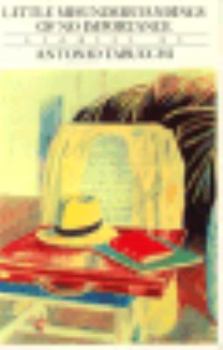Little Misunderstandings of No Importance: Stories
Select Format
Select Condition 
Book Overview
The eleven short stories in this prize-winning collection pivot on life's ambiguities and the central question they pose in Tabucchi's fiction: is it choice, fate, accident, or even, occasionally, a kind of magic that plays the decisive role in the protagonists' lives? Blended with the author's wonderfully intelligent imagination is his compassionate perception of elemental aspects of the human experience, be it grief as in "Waiting for Winter," about the widow of a nation's literary lion, or madcap adventure as in "The Riddle," about a mysterious lady and a trip in Proust's Bugatti Royale.
Format:Paperback
Language:English
ISBN:0811211118
ISBN13:9780811211116
Release Date:September 1989
Publisher:New Directions Publishing Corporation
Length:136 Pages
Weight:1.15 lbs.
Dimensions:0.4" x 5.2" x 7.8"
Customer Reviews
2 ratings
Little Ambiguities
Published by Thriftbooks.com User , 23 years ago
Tabucchi writes both novellas and short story collections. He's a minimalist but one who chooses his few words well. His writing seems slight at first and his plots almost nonexistent but there is a momentum that builds as you get to know him from story to story, his deceptively simple words and stories are like queries as to what the nature of life might be. This collection is just eleven short(10 pgs each) attempts to show how life might occur . The first story ,"Little Misunderstandings..."is about a group of friends. Each fall into roles chosen for them by the accidents of circumstance and all seem helpless to be able to participate in their lives except as observers who find themselves mildly amusing. "Waiting for Winter" is a story Tabucchi himself says he wishes Henry James would have written. As Tabucchi tells it we see the widow of a great man of letters going through the motions of mourning. But there is at stories end a twist. James would have filled in the story with sufficient nuance and detail to give the reader a clear picture of a particular psychology and at least give us as readers a chance at understanding a characters motive for doing a certain thing. Tabucchi only gives you the barest amont of information. The last event of the story therefore remains an inexplicable one, the story remains an unsolved ambiguity. Tabucchi is interested in the interior lives of his characters but everything that happens there remains unclear, not really describable except in the most cursory way. His characters do not have psychologies in the traditional sense, "psychology" implies certain identifiable attributes and a certain consistency of character. The strongest thing a Tabucchi character has is perhaps a vague and growing suspicion or a never quite articulated emotion. "Things" have special importance in these stories or sometimes seem to because they seem to have a more stable existence than the characters themselves. In "The Riddle" an automobile that may have belonged to Proust is only one uncertainty in a story where nothing is certain, the car is the dominant image of the story, it is the central thing which draws our attention, it seems to tie the various aspects of the story together. Everything about the unlikely events related in the story is shady and shadowy and perhaps nothing more than a dream. Only the car seems to hold some significant meaning, carry some symbolic weight but ....but it doesn't. Its just a riddle after all. Tabucchi's point in these stories is that the only way to make sense of ambiguous reality is to simplify it for ourselves. So the story crafting process for him is a playful one. The reader may want a solution or think he is supposed to look for one but there is not necessarily one there to be found. Not all the stories work in the same way. He has more than one tactic. Some are more conventional and some more fantastic. But all refuse to simplify, and so remain in the end ambiguities or complex puzzl
More short stories by a master of ambiguity
Published by Thriftbooks.com User , 24 years ago
These is my least favorite of Tabucchi's books; however, it is still sufficiently good that I recommend it.In his notes preceeding the stories, Tabucchi states: "Misunderstandings, uncertainities, belated understandings, useless remorse, treacherous memories, stupid and irredeemable mistakes, all these irresisibly fascinate me ..." That fascination is the basis for several of these stories.The title story is begins as a court scene in which the judge, the defendent and the narrator were good friends in the past and discover what roles they must play in the present."Waiting for Winter" follows the widow of an important literary figure as she does what is expected of her and what her emotions lead her to do."Spells" tells of a summer holiday with an aunt and a cousin whose dislike of her step father and her interest in magic may have gone a bit too far."The Trains That Go to Madras" follows a narrator whose cabin mate is Peter Schlemihl (of literary fame)."Sleight of Hand" follows an organized crime courier who knows he is growing too old and tire for his job.The remaining stories show equal diversity and equal interest in life in some sense out of focus, uncertain, ambiguous. As usual, Tabucchi is well worth reading but if you are unfamiliar with him, I'd suggest that you read Letter From Casablanca first if you prefer short stories or Requiem if you prefer novellas.






